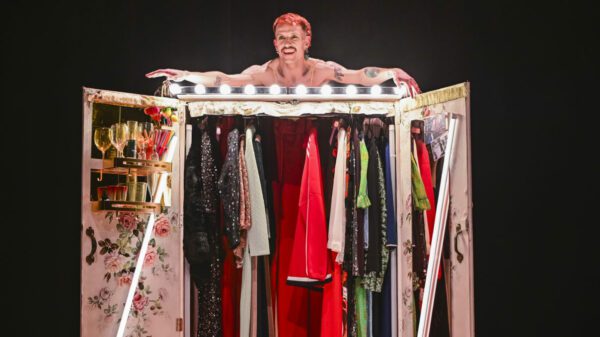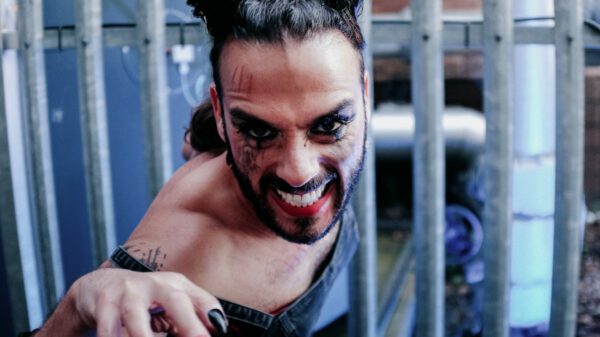Queer Contact Double Bill: Grandmother’s Closet & An Audience with Milly-Liu

Queer Contact 2023, Contact’s “flagship queer arts festival”, had quite the eclectic line-up, including an audacious double bill: Grandmother’s Closet and An Audience with Milly-Liu.
Grandmother’s Closet was the first piece, with an hour’s gap before An Audience with Milly-Liu. Both Grandmother’s Closet and An Audience with Milly-Liu were (pretty much) one-man shows. They were performed in a small theatre seating just 70 people which meant the audience were close to all the action. While they did have their similarities, the pieces felt tonally very different from each other, demonstrating the breadth of theatre that can be performed in the space.
Grandmother’s Closet

Grandmother’s Closet felt a bit like sneaking a peek into someone’s private life. Although the audience feels included, the main audience is Nan, who stands as a presence behind us. From start to finish, Luke Hereford and his keyboard player, Bobby Harding, had me completely enraptured.
The whole play is performed from a makeshift grandma’s bedroom. Pulling sheets off of furniture reveals first the glorious titular closet and secondly a dresser with a small washing machine. Behind this sits a keyboard player, dramatically revealed as the sheets are pulled aside. Once opened, lights, and a minibar make the wardrobe feel like its own little world. Despite the relatively minimal design, the small audience and stage make the whole set-up feel incredibly intimate.
Hereford starts the play in just a pair of Y-fronts and greets the audience as they enter. He has an infectious energy which makes the space feel welcoming. Over the course of the play, Hereford changes into a variety of outfits to highlight different memories. These start with early dressing up in the glorious polyester of Nan’s wardrobe.
I cannot talk about this play without mentioning the plethora of pop covers. These are beautifully showcased with energetic dance routines to match. My favourite of these is a mash-up of Filthy/Gorgeous and Take Your Mama by the Scissor Sisters.
As well as the joy, however, Hereford also talks about his experience of homophobia, which contrasts with his grandmother’s love and support of him. These moments are sombre and heartwrenching, highlighting the struggle of being gay in rural Wales.
The way this is communicated very much displays the joy of queer youth when nurtured. It is not that the homophobes might be right, it is that they are difficult to ignore. The message is positive and, while autobiographical, there are many points that resonate and speak to the support of queer youth and the adults they grow into.
Overall, this is the best kind of queer theatre. By the end, I feel embraced. The play does not shirk from some heavier topics, but it does not give the negative voices merit. Queer joy and support of queer kids is the message here.
An Audience with Milly-Liu

The second part of the double bill, An Audience with Milly-Liu, is a much more graphic piece of theatre. The stage has been toned down. All the stage has to offer a bar stool, a microphone and a coffee table (decked with a bottle of San Pelligrino). As the audience finishes filtering in, a strong Cardiff accent starts asking us all: “Is he here?”, this voice belongs to the woman we all recognise as Milly-Liu (François Pandolfo).
If you have walked around Manchester recently, you will have seen posters of Milly-Liu for Queer Contact. Her dark-rimmed eyes stare up at you in despair or desperation. In person, she is equally as dishevelled. Something has happened, and over the next hour, we learn about it.
Milly-Liu is a cat actress. Once, she rolled with the best, but a large amount of sexual abuse caused her to leave. Her smeared make-up and cocaine moustache reveal the cracks in a practised facade. At one point, with knickers and fishnets around her ankles, she tells us, “I am feeling classy”.
The presentation of facts of the film industry comes across as a joke, but occasional spacey noises and weird lighting reveal a deeper hurt. Milly-Liu has been exploited in every way and now exhibits a desperate need for affirmation in the form of this exploitation. She has a story about losing her kittens as they were given away to children on Christmas. At the end of this heartbreaking story, she seems to remember where she is. She was only joking, she claims. She never had kittens.
There is something to be said about reclaiming sexuality after an assault. There is a desperation in Milly-Liu’s repeated offers of sex, and the blunt way the lines are delivered skirts the line between funny and uncomfortable. She is bossy and loudmouthed, slagging off everyone from David Attenborough to the MeToo movement. Even the audience is criticised and told to shut up, yet continue to enjoy it.
This is not a fun play. I think, however, it might be good. Despite the incredibly heavy themes of sexual assault and some uncomfortable audience interaction, this was a comedy. The woman next to me could barely stop laughing, even when forced to make cat sex noises.
In an especially memorable scene, Milly-Liu compares her pussy to a blender, making eye contact with a woman in the front row as she changes from set one to set two, to pulse. By the end of the play, I really have seen it all. It’s a graphic, uncomfortable, yet incredibly funny show.
Unlike the first play, this feels more like a slap in the face and a cry for help, but is that not equally important? Sometimes, queer theatre is an appreciation for the community and our strongest allies. Other times, it’s self-described “one-man-cat-drag-late-night comedy”. Both of these one-man shows felt like a celebration of queerness and the joy of self-expression. It’s just that sometimes that expression is a journey through your grandmother’s closet, and other times it’s dressing up as a cat.







